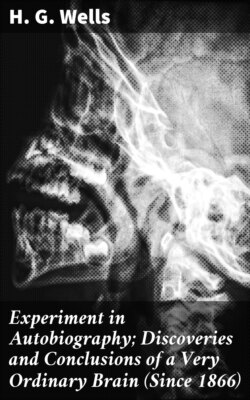Experiment in Autobiography; Discoveries and Conclusions of a Very Ordinary Brain (Since 1866)

Реклама. ООО «ЛитРес», ИНН: 7719571260.
Оглавление
H. G. Wells. Experiment in Autobiography; Discoveries and Conclusions of a Very Ordinary Brain (Since 1866)
Experiment in Autobiography; Discoveries and Conclusions of a Very Ordinary Brain (Since 1866)
Table of Contents
ILLUSTRATIONS
EXPERIMENT. IN AUTOBIOGRAPHY
CHAPTER THE FIRST
CHAPTER THE SECOND
CHAPTER THE THIRD
CHAPTER THE FOURTH
CHAPTER THE FIFTH
CHAPTER THE SIXTH
CHAPTER THE SEVENTH
CHAPTER THE EIGHTH
CHAPTER THE NINTH
INDEX
Отрывок из книги
H. G. Wells
Published by Good Press, 2021
.....
The new order of things that was appearing in the world when I was born, was already arousing a consciousness of the need for universal elementary education. It was being realized by the ruling classes that a nation with a lower stratum of illiterates would compete at a disadvantage against the foreigner. A condition of things in which everyone would read and write and do sums, dawned on the startled imagination of mankind. The British and the National Schools, which had existed for half a century in order to make little Nonconformists and little Churchmen, were organized into a state system under the Elementary Education Act of 1871 and supplemented by Board Schools (designed to make little Unsectarian Christians). Bromley was served by a National School. That was all that the district possessed in the way of public education. It was the mere foundation of an education. It saw to the children up to the age of thirteen or even fourteen, and no further. Beyond that the locality had no public provision for technical education or the development of artistic or scientific ability whatever. Even that much of general education had been achieved against considerable resistance. There was a strong objection in those days to the use of public funds for the education of "other people's children," and school pennies were exacted weekly from the offspring of everyone not legally indigent.
But side by side with that nineteenth-century National School under the Education Act, the old eighteenth-century order was still carrying on in Bromley, just as it was still carrying on in my mother's mind. In the eighteenth century the lower classes did not pretend to read or write, but the members of the tenant-farmer, shopkeeper, innkeeper, upper servant stratum, which was then, relatively to the labourers, a larger part of the community, either availed themselves of the smaller endowed schools which came down from the mental stir of the Reformation, or, in the absence of any such school in their neighbourhood, supported little private schools of their own. These private schools were struggling along amidst the general dissolution, shuffling and reconstruction of society that was already manifest in the middle nineteenth century, and the Academy of Mr. Thomas Morley was a fairly well preserved specimen, only slightly modernized, of the departing order of things.
.....